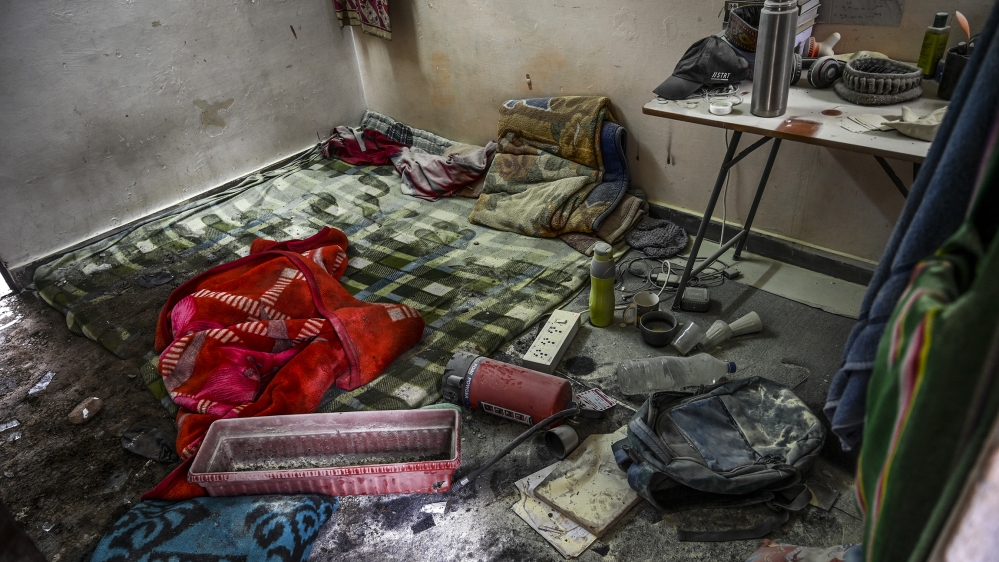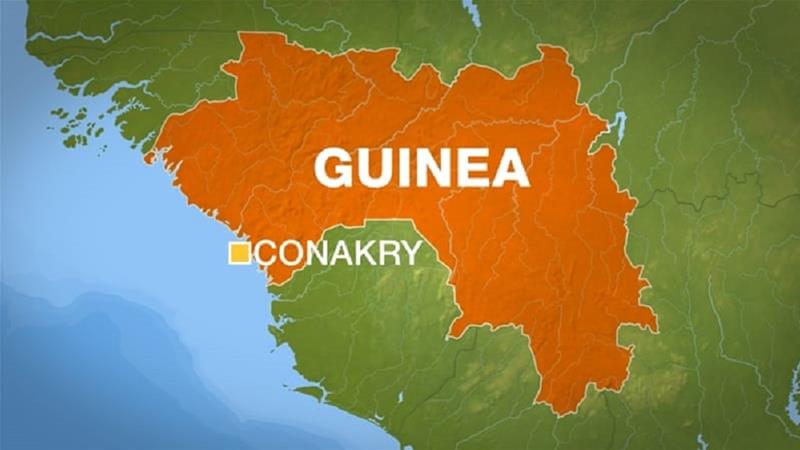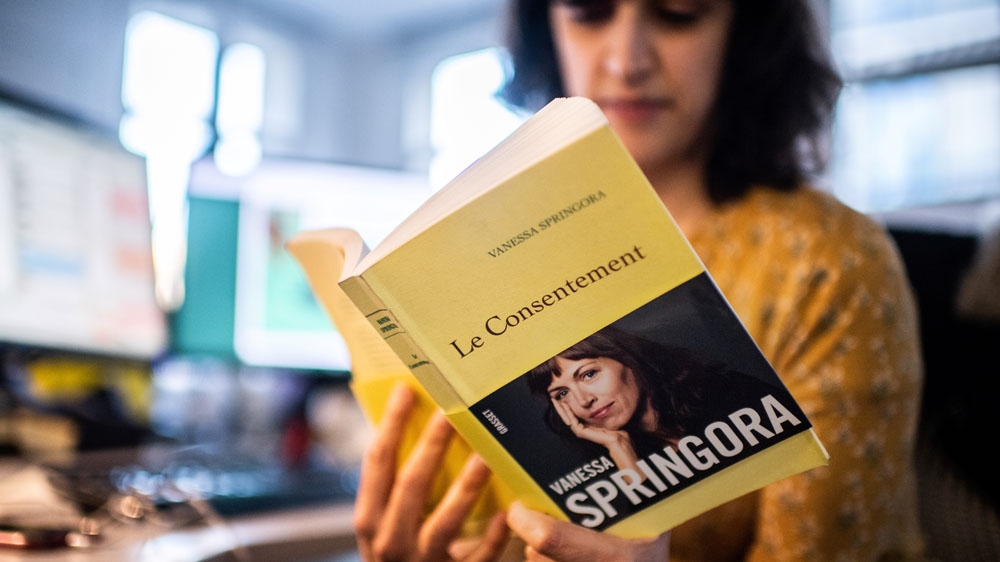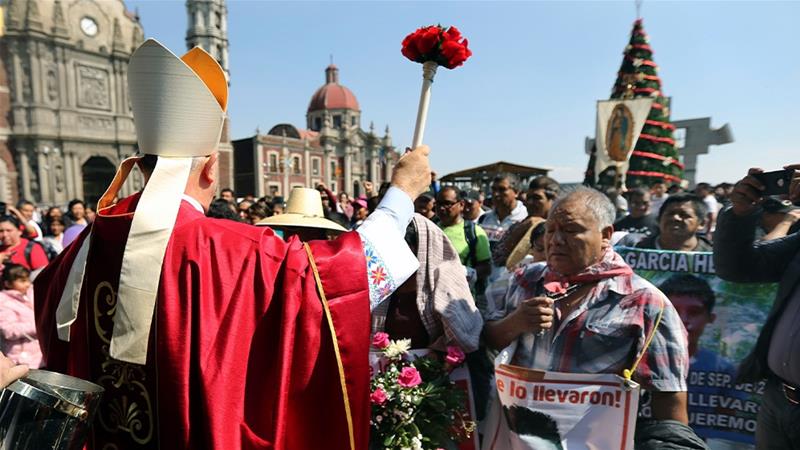Spain's rural regions have lost 28 percent of their populations in the past 50 years.
by Alasdair Fotheringham
6 Jan 2020
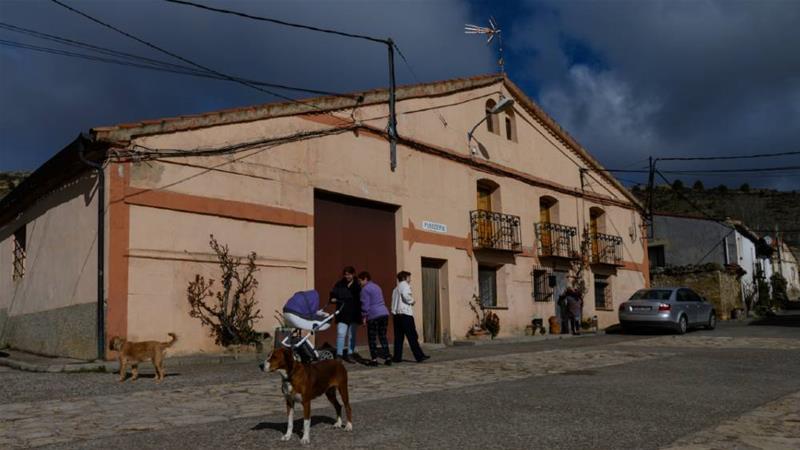
The depopulation of Spain's interior has become a focus
of attention, with under-investment in small communities
a driving force of emigration [Pierre-Philippe Marcou/AFP]
Madrid, Spain - Sitting 2,000 metres above sea level on the southern edge of the province of Teruel, the Javalambre astrological observation station is said to offer one of the clearest night skies in Europe for stargazers.
But cast your eyes back down to earth, and there is a grim reason for Javalambre's much-appreciated dearth of light pollution.
For decades now, Teruel's population has been draining away, and in 2017 some parts had sunk to an average of 1.63 inhabitants per square kilometre - lower than that of Lapland in Sweden, internationally famous for being one of Europe's most remote regions.
And it is not just Teruel. Spain's rural depopulation crisis has reached a point where five of its regions - Aragon, Castilla y Leon, Castilla-La Mancha, Extremadura and La Rioja make up 53 percent of its territory, but now have only 15 percent of its residents.
"It's a real environmental, human and historic problem - a disaster for the whole country," Tomas Guitarte tells Al Jazeera.
In November's elections, Guitarte became the first MP to represent a Spanish political association specifically created to fight rural depopulation. It is named Teruel Existe ["Teruel Exists"].
Although the industrial development plans forged by Spain's former dictator, General Francisco Franco, kickstarted the rural depopulation process in the 1960s, Guitarte believes 40 years of state inaction in the democracy following Franco has meant it has not been reversed.
"Recently when I met the king, I reminded him how back when, as crown prince, he'd come to Teruel in 2000," he said. "We'd told him the region's biggest problems were depopulation and the lack of infrastructure.
"Nineteen years have passed and those problems become even more serious - and places like Teruel risk ending up completely empty."
Guitarte, whose own family left the region when he was aged 10 - "basically because they wanted us to live somewhere I could get some worthwhile academic qualifications, which was nearly impossible at the time in Teruel" - says one of Franco's ministers, Cruz Martinez Esteruelas, indicated the state's underlying intentions towards his region back in 1974 when opening an education centre.
"He more or less said that if it was the destiny of the people of Teruel to emigrate to benefit other regions, we should at least get some schooling before we left.
The emigration hasn't been natural, it was programmed, thanks to the state's lack of action, and despite Teruel's well-placed geographical location in the middle of Spain
TOMAS GUITARTE
"That's what's most scandalous - the emigration hasn't been natural, it was programmed, thanks to the state's lack of action, and despite Teruel's well-placed geographical location in the middle of Spain.
"That explains, too, why industrialisation back then took place on the Spanish coast, not inland in Teruel. After mining our natural resources, they shipped them away, in what was a form of colonialism," he said.
More than four decades later, the absence of state investment, transport infrastructure and employment opportunities has done nothing to slow down the depopulation process, with Guitarte pointing to the vast areas of Teruel - "around 40 percent still lacking any kind of internet broadband coverage" - as one example of ongoing institutional neglect.
READ MORE
Are Global South experts sidelined in climate conversations?
Should Socialist leader Pedro Sanchez finally succeed in forming a government this week, he has promised universal broadband across Spain, as well as stepping up rural health care.
But the most striking example of Teruel's abandonment is surely the transport sector. Spain is famous for having the greatest length of high-speed railways per inhabitant in the world, but when Madrid's high-speed train connection to Valencia was constructed in the early 2000s, pleas for it to go through Teruel fell on deaf ears.
As for the double-track railway offered in compensation, it has never been built, while a video published by Teruel Existe in 2018 of a tractor overtaking the province's one ultra-slow train, travelling at around 30km/h, remains a Spanish social media hit.
Repeated requests for comment made to Spain's Ministry of Transport and Development for this report were unsuccessful.
Sick of empty promises, Guitarte's decision to head for Madrid as an MP followed an epiphany of sorts.
"We realised we need to be in the seat of power to get anything done," he said. "We've had demonstrations, we've signed petitions. They haven't worked. Getting into Parliament, with the backing of the people, feels like Teruel's last throw of the dice."
Nearly 600 kilometres (370 miles) further south, in the tiny village of Torvizcon in Andalucia, 31-year-old physiotherapist Adrian Moron Sanchez tells Al Jazeera how the population here has plummeted since he was growing up.
"When I was a kid there were 1,200 people in the village," Moron Sánchez says. "Now that has halved to 673, and lots of people from the other villages round here tell me the same kind of drop in population has happened in their towns too."
Climate change, he says, accompanied by increasingly inclement weather and heavy frosts has played a part in the mass emigration "because the almond and olive harvests have been bad, and a construction company went bust in 2012".
"It's really sad, when I go back, I walk through streets which were once full of life, but now they are dying on their feet."
People want to stay in the villages; it's a question of how and what they get in return
MARIA ANDRES
Any plan to slow depopulation requires spending in isolated areas to help retain people in these small communities.
"There needs to be far more investment and subsidies on offer from the regional government for small-scale, agroecological local businesses or crafts as a way of ensuring the benefits, financial or otherwise, remain in the villages," says Maria Andres, an activist with the Ecologistas en Accion pro-environmental movement.
She worked for 15 years on an extensive livestock project in Cuenca in central Spain, and says "people want to stay in the villages; it's a question of how and what they get in return".
In the battle against depopulation, some places like Pescueza, a tiny village of just 172 people in the western region of Extremadura, have developed a strategy called Quedate con nosotros ("Stay with us") making it as attractive as possible to its senior citizens, who make up 65 percent of inhabitants.
With a new day centre, special free vehicles for pensioners, railings on the slightest slope, even anti-slip paint, the village has seen an upturn not just in its senior citizens but across the generations.
No fewer than 14 children have been born in the village in the past seven years since the day centre opened - after 17 years without any births at all.
"Our project would work well for smaller towns with populations of under 1,000," Andres Rodriguez, mayor of Pescueza, told Al Jazeera. With just 1.3 percent of Spain's population living in villages of fewer than 500 people, "[this] is where the biggest problem in Espana vacia is right now", he said. "It would help them flourish again."
But central government policies attempting to halt the growth of Spain's disappearing regions still appear sorely lacking, say activists.
"Depopulation is a very serious problem for Spain; more important than the questions of Catalonia or the Basque Country - the areas involved [in the depopulation crisis] are more than half the country's territory," concluded Guitarte.
"The state itself has generated this problem of two Spains, the 'developed Spain' and the 'empty Spain'. Now we need some kind of political action by the state to redress the balance."
SOURCE: AL JAZEERA NEWS
MORE ON EUROPEEU Commission chief warns UK ahead of trade talksBoris Johnson: Soleimani had blood of British troops on his handsPutin and Erdogan call for Libya ceasefire'No survivors': Ukrainian jet crashes in Iran with 176 on board
Madrid, Spain - Sitting 2,000 metres above sea level on the southern edge of the province of Teruel, the Javalambre astrological observation station is said to offer one of the clearest night skies in Europe for stargazers.
But cast your eyes back down to earth, and there is a grim reason for Javalambre's much-appreciated dearth of light pollution.
For decades now, Teruel's population has been draining away, and in 2017 some parts had sunk to an average of 1.63 inhabitants per square kilometre - lower than that of Lapland in Sweden, internationally famous for being one of Europe's most remote regions.
And it is not just Teruel. Spain's rural depopulation crisis has reached a point where five of its regions - Aragon, Castilla y Leon, Castilla-La Mancha, Extremadura and La Rioja make up 53 percent of its territory, but now have only 15 percent of its residents.
More:In the past 50 years, Spain's rural regions have lost 28 percent of their population, and are now popularly known as la Espana vacia - empty Spain. In Teruel, part of Aragon, with a drop in population of nine percent in the past decade alone, the loss has been particularly noticeable.
'Cleaner and cheaper': Sunny Spain is banking on renewable energy
Planet SOS: Stalemate at COP25 as Earth continues to warm
Spanish politics undermining climate change fight
"It's a real environmental, human and historic problem - a disaster for the whole country," Tomas Guitarte tells Al Jazeera.
In November's elections, Guitarte became the first MP to represent a Spanish political association specifically created to fight rural depopulation. It is named Teruel Existe ["Teruel Exists"].
Although the industrial development plans forged by Spain's former dictator, General Francisco Franco, kickstarted the rural depopulation process in the 1960s, Guitarte believes 40 years of state inaction in the democracy following Franco has meant it has not been reversed.
"Recently when I met the king, I reminded him how back when, as crown prince, he'd come to Teruel in 2000," he said. "We'd told him the region's biggest problems were depopulation and the lack of infrastructure.
"Nineteen years have passed and those problems become even more serious - and places like Teruel risk ending up completely empty."
Guitarte, whose own family left the region when he was aged 10 - "basically because they wanted us to live somewhere I could get some worthwhile academic qualifications, which was nearly impossible at the time in Teruel" - says one of Franco's ministers, Cruz Martinez Esteruelas, indicated the state's underlying intentions towards his region back in 1974 when opening an education centre.
"He more or less said that if it was the destiny of the people of Teruel to emigrate to benefit other regions, we should at least get some schooling before we left.
The emigration hasn't been natural, it was programmed, thanks to the state's lack of action, and despite Teruel's well-placed geographical location in the middle of Spain
TOMAS GUITARTE
"That's what's most scandalous - the emigration hasn't been natural, it was programmed, thanks to the state's lack of action, and despite Teruel's well-placed geographical location in the middle of Spain.
"That explains, too, why industrialisation back then took place on the Spanish coast, not inland in Teruel. After mining our natural resources, they shipped them away, in what was a form of colonialism," he said.
More than four decades later, the absence of state investment, transport infrastructure and employment opportunities has done nothing to slow down the depopulation process, with Guitarte pointing to the vast areas of Teruel - "around 40 percent still lacking any kind of internet broadband coverage" - as one example of ongoing institutional neglect.
READ MORE
Are Global South experts sidelined in climate conversations?
Should Socialist leader Pedro Sanchez finally succeed in forming a government this week, he has promised universal broadband across Spain, as well as stepping up rural health care.
But the most striking example of Teruel's abandonment is surely the transport sector. Spain is famous for having the greatest length of high-speed railways per inhabitant in the world, but when Madrid's high-speed train connection to Valencia was constructed in the early 2000s, pleas for it to go through Teruel fell on deaf ears.
As for the double-track railway offered in compensation, it has never been built, while a video published by Teruel Existe in 2018 of a tractor overtaking the province's one ultra-slow train, travelling at around 30km/h, remains a Spanish social media hit.
Repeated requests for comment made to Spain's Ministry of Transport and Development for this report were unsuccessful.
Sick of empty promises, Guitarte's decision to head for Madrid as an MP followed an epiphany of sorts.
"We realised we need to be in the seat of power to get anything done," he said. "We've had demonstrations, we've signed petitions. They haven't worked. Getting into Parliament, with the backing of the people, feels like Teruel's last throw of the dice."
Nearly 600 kilometres (370 miles) further south, in the tiny village of Torvizcon in Andalucia, 31-year-old physiotherapist Adrian Moron Sanchez tells Al Jazeera how the population here has plummeted since he was growing up.
"When I was a kid there were 1,200 people in the village," Moron Sánchez says. "Now that has halved to 673, and lots of people from the other villages round here tell me the same kind of drop in population has happened in their towns too."
Climate change, he says, accompanied by increasingly inclement weather and heavy frosts has played a part in the mass emigration "because the almond and olive harvests have been bad, and a construction company went bust in 2012".
"It's really sad, when I go back, I walk through streets which were once full of life, but now they are dying on their feet."
People want to stay in the villages; it's a question of how and what they get in return
MARIA ANDRES
Any plan to slow depopulation requires spending in isolated areas to help retain people in these small communities.
"There needs to be far more investment and subsidies on offer from the regional government for small-scale, agroecological local businesses or crafts as a way of ensuring the benefits, financial or otherwise, remain in the villages," says Maria Andres, an activist with the Ecologistas en Accion pro-environmental movement.
She worked for 15 years on an extensive livestock project in Cuenca in central Spain, and says "people want to stay in the villages; it's a question of how and what they get in return".
In the battle against depopulation, some places like Pescueza, a tiny village of just 172 people in the western region of Extremadura, have developed a strategy called Quedate con nosotros ("Stay with us") making it as attractive as possible to its senior citizens, who make up 65 percent of inhabitants.
READ MORESpanish politics undermining climate change fight
With a new day centre, special free vehicles for pensioners, railings on the slightest slope, even anti-slip paint, the village has seen an upturn not just in its senior citizens but across the generations.
No fewer than 14 children have been born in the village in the past seven years since the day centre opened - after 17 years without any births at all.
"Our project would work well for smaller towns with populations of under 1,000," Andres Rodriguez, mayor of Pescueza, told Al Jazeera. With just 1.3 percent of Spain's population living in villages of fewer than 500 people, "[this] is where the biggest problem in Espana vacia is right now", he said. "It would help them flourish again."
But central government policies attempting to halt the growth of Spain's disappearing regions still appear sorely lacking, say activists.
"Depopulation is a very serious problem for Spain; more important than the questions of Catalonia or the Basque Country - the areas involved [in the depopulation crisis] are more than half the country's territory," concluded Guitarte.
"The state itself has generated this problem of two Spains, the 'developed Spain' and the 'empty Spain'. Now we need some kind of political action by the state to redress the balance."
SOURCE: AL JAZEERA NEWS
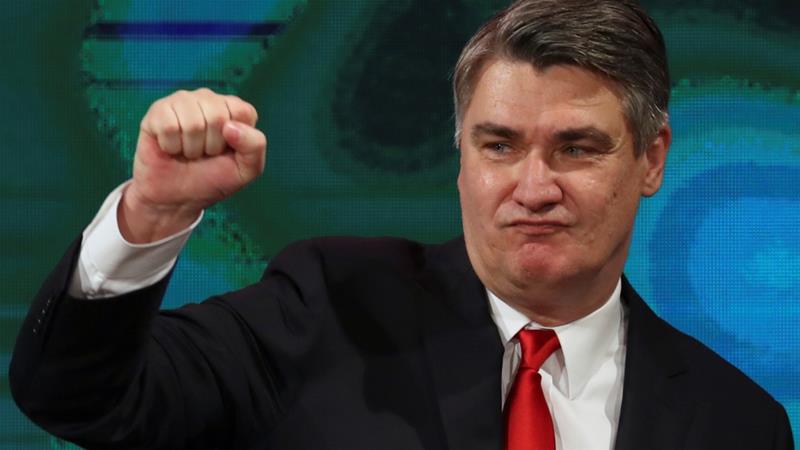

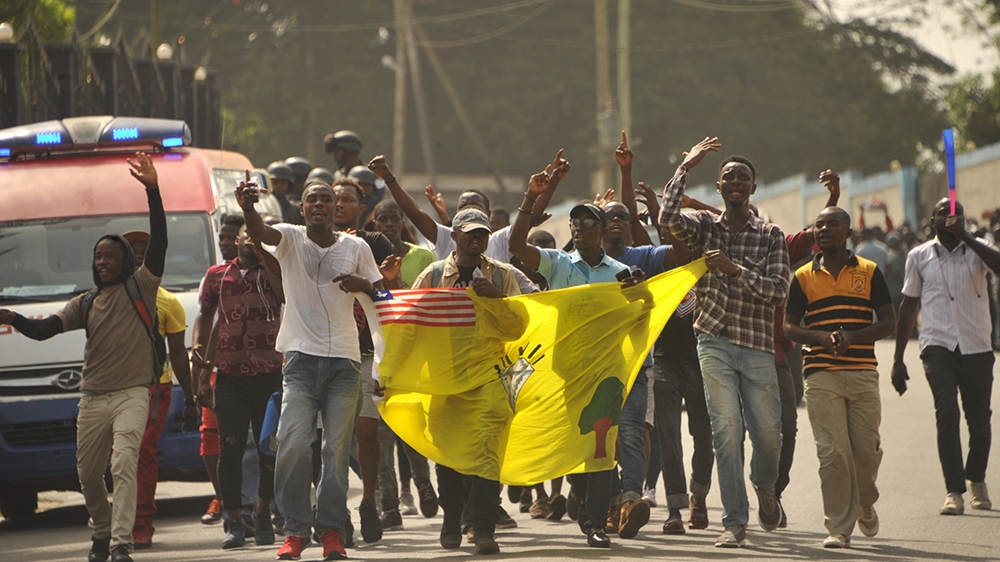
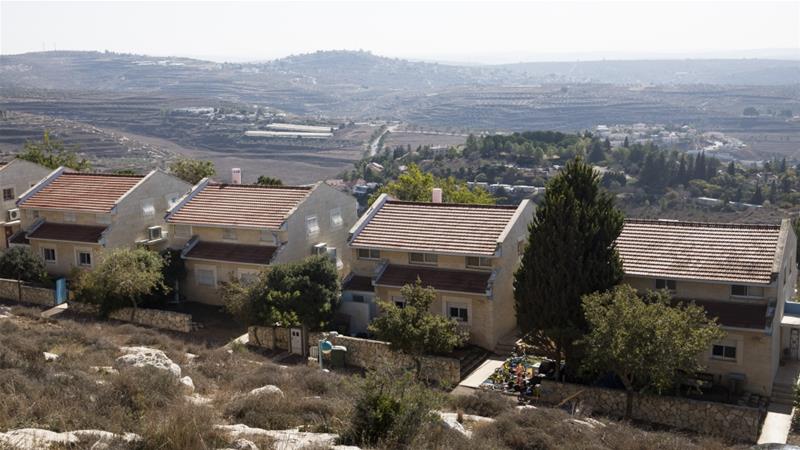


 Police said about 1,500 students joined the protests, which remained peaceful [Munir Uz Zaman/AFP]
Police said about 1,500 students joined the protests, which remained peaceful [Munir Uz Zaman/AFP]

